I’m thrilled to be able to share an interview with revered rosarian Anne Belovich (pictured below with her husband Max). This interview took place in August of 2021, just months before Anne passed away at the age of 97.
I am so thankful to have gotten a chance to know her and am so inspired by how fully and generously she lived her life.
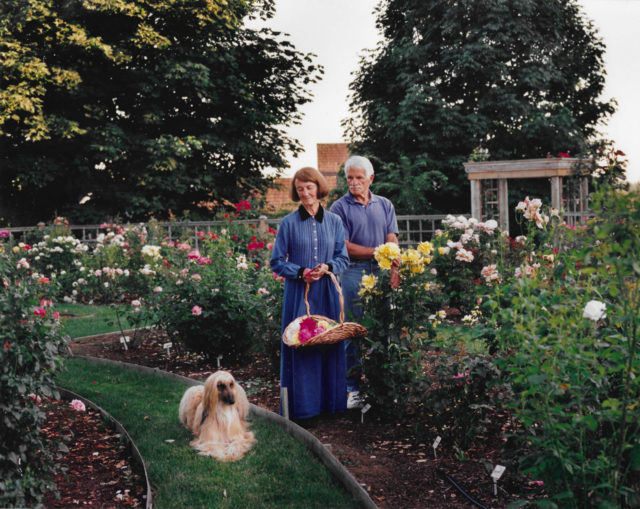
You’ve had a very full career and an even fuller life—first as a botanist, then a teacher, then a sailor, a general contractor, and then a rosarian and a writer. Can you tell me a little bit more about your very diverse life path?
I have had a very full life and while much is owed to the length of my life, my longevity, likewise, probably benefited from having a full, diverse life. Life-long learning and growing keeps one engaged.
It would probably surprise many of your readers to know that I used to consider myself a prisoner in my mother’s garden. We lived in Morro Bay on a high bluff. As a young child of three, maybe four, I used to run away—down the trail, that certainly wasn’t made for children, as fast as I could go down to the water. I’d get down there in the sand and there would be crabs and herons that would be fishing—so many wonderful things to see.
My mother would come screaming down after me, drag me back, and tell me to stay in the garden. The water is where I wanted to be and I managed to sneak out often until my mother put up THE fence. My mother had a wonderful garden considering those times and her means. It was always about nature though. My appreciation of flowers came later.
My life could have played out very differently if not for losing my first husband in World War II. He was such an amazing man—very handsome, very good to me, and talented. I ran away from home to be with him and get married. He entered the military and became a fighter pilot in the 1st Air Commando group under Colonel Cochran, with the mission of flying behind Japanese lines to supply and evacuate troops and materials as well as provide fire.
My husband completed the ‘Thursday’ mission but died shortly after because of his airplane’s mechanical failure. This left me as a 19-year-old widow and new mother who had to find her own way in life. If not for this tragedy, I would have most likely had more children and settled down into a role very different from the many I’ve had since that time.
One thing that isn’t mentioned above, but is very dear to me, are the numerous volunteer and board positions I’ve held, especially co-creator of NOAH, the Northwest Organization for Animal Help, in Stanwood, Washington, which is dedicated to ending euthanasia of healthy, adoptable, and treatable homeless dogs and cats. Our humble beginnings consisted of volunteering once a week to answer phones and match the people who had lost their animals to those who had found animals on the Island.
As a result of the ever-growing need to save more animals and serve the community, we expanded adoption and a transfer/low-cost spaying and neutering program. In coordination with over 50 other shelters, NOAH transfers animals at risk of euthanasia to continue to work on giving them a second chance. I was on the board until my husband Max needed more care to stay in our home at the end of his life. However, I still donate to this important cause and others that lessen the suffering of animals, both domestic and wild, and work to conserve biodiversity on our planet. Much more work needs to be done in these areas.
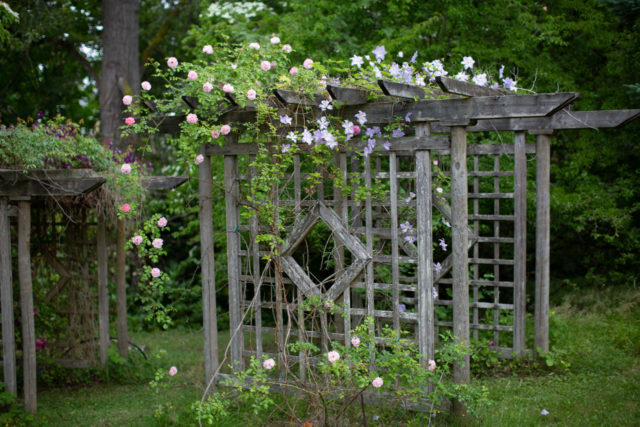 In the introduction to Ramblers & Other Rose Species Hybrids, you say that “fortunate circumstances” led you to start a small rose garden. That small rose garden evolved into 5 acres of nearly 1,000 unique varieties (which eventually became the largest private collection in North America). Can you tell Floret readers a little bit more about this fortunate circumstance? What was it about roses in particular that put you under their spell?
In the introduction to Ramblers & Other Rose Species Hybrids, you say that “fortunate circumstances” led you to start a small rose garden. That small rose garden evolved into 5 acres of nearly 1,000 unique varieties (which eventually became the largest private collection in North America). Can you tell Floret readers a little bit more about this fortunate circumstance? What was it about roses in particular that put you under their spell?
I just love them so. I’m a very visual person and the beauty that roses bring into my world gives me great joy. The “fortunate circumstances” I referred to in my book on ramblers was that I read an advertisement about a nursery in Oregon that was going out of business and having a big sale.
The ramblers were a really good price, and I came back with a truckload of them which I put on the fences around the property. I also put some into trees by building trellises to help support their growth. There was something wonderfully mysterious about roses growing up the trellises and into the trees to make the tree look as though it was blooming.
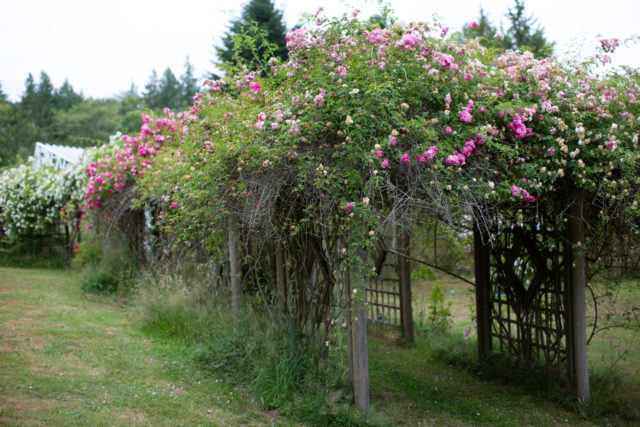 You’ve written five books on roses, but have a deep love of rambling roses. What do you wish others knew about this amazing group of plants and why they should consider growing them in their garden?
You’ve written five books on roses, but have a deep love of rambling roses. What do you wish others knew about this amazing group of plants and why they should consider growing them in their garden?
Ramblers are easy to grow. Once they are established, they need little care. They grow tall and are excellent for covering fences and arbors, and for growing into trees. They provide a quick and easy way to add color to the garden.
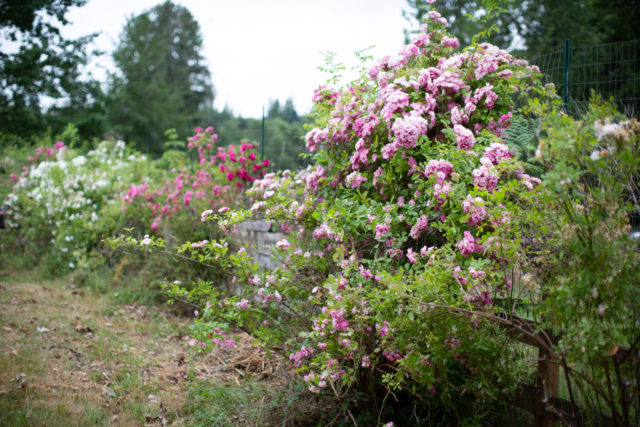 You’ve scoured the globe for rare rose varieties. What are some of your favorite specialty nurseries? And besides your own wonderful books, do you have any other books or resources that you’d recommend for beginning and experienced rose growers?
You’ve scoured the globe for rare rose varieties. What are some of your favorite specialty nurseries? And besides your own wonderful books, do you have any other books or resources that you’d recommend for beginning and experienced rose growers?
While I have traveled the world, I like to support local, small business owners as much as possible. Their work is hard, and we have lost many nurseries, especially those that focus on old roses. Vintage Roses used to be the best but went out of business. I enjoy going to Christianson’s Nursery & Greenhouse in Mount Vernon, Washington. Two others are Hortico in Canada and Rogue Valley Roses in Oregon.
As for books, Classic Roses by Peter Beales is a very important reference book if you are serious about roses. Another one that was very helpful to me in the beginning was David Austin’s English Roses by David Austin and Michael Marriott.
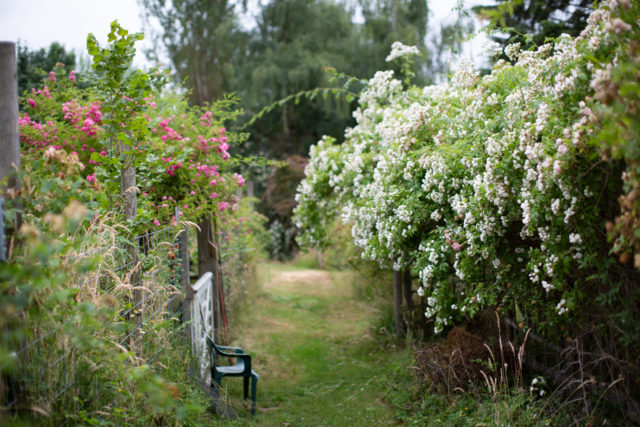 I always hate it when people ask me what my favorite flower is because there are too many treasures to choose from, but if you could only grow five roses in your garden, what would they be?
I always hate it when people ask me what my favorite flower is because there are too many treasures to choose from, but if you could only grow five roses in your garden, what would they be?
I really don’t have a favorite. All of them are so unique and bring something special with them. If I must choose one, I think it would have to be Hybrid R. Moyesii ‘Geranium’. In my book, Ramblers and Other Rose Species Hybrids, I mention that mine had grown to 10 feet (3 meters). That was in 2016. It is now running way up into the trees and spills over in a striking cascade of scarlet red in early summer. It fills the view from my dressing room window.
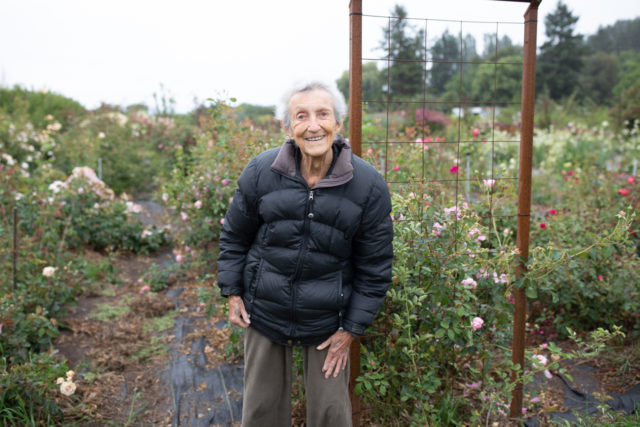
Pictured above: Anne visiting our rose garden this past summer
Your passion for roses started much later in life. Do you have any advice for someone who feels like it’s too late to pursue their dreams?
I remember when I turned 60. I thought 60 was so old. That was almost 37 years ago, well over one-third of my lifetime so far.
At almost 97 years old, it doesn’t seem that my passion for roses started all that late in life. It’s been over 30 years since I began this journey—longer than the careers of many. I pursued many dreams after turning 60, including starting my own contracting company and building over 25 (mostly Victorian style) houses, traveling the world, and my study of the older roses. It is never too late to act on your goals and dreams.
My advice is to keep moving, stay out of bed, go out to lunch and visit with friends and family (don’t isolate yourself), read and stay up to date with current events, be open to new ideas, and commit yourself to life-long learning and skill development.
In fact, I am about to launch my own website and blog. I’ve always wanted my own website and I don’t think it’s too late to do this. I bought my own domain last week.
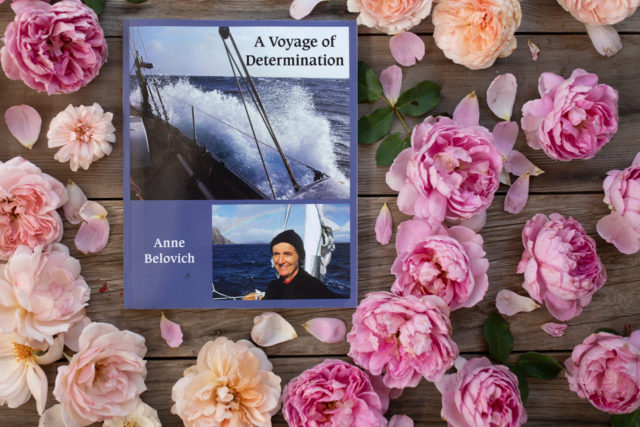 In your book, A Voyage of Determination, which chronicles your incredible adventure sailing your beloved boat from New Zealand to California, you share your formula for achieving any difficult goal, which I found incredibly inspiring as a woman who has big dreams. You write:
In your book, A Voyage of Determination, which chronicles your incredible adventure sailing your beloved boat from New Zealand to California, you share your formula for achieving any difficult goal, which I found incredibly inspiring as a woman who has big dreams. You write:
“When I was alone I spent much of my time thinking about the fantastic trip I had been privileged to experience. It was of great value to me in a way that was quite separate from getting the boat back. I had learned that I was capable of accomplishing very difficult goals. I was able to face considerable hardships and even extreme danger when it was necessary to achieve those goals. Without being quite aware of it I had developed a formula for greatly improving the chances of achieving any difficult goal. It consisted of three main parts.
First, don’t let being a woman stop you from doing what is traditionally seen as a man’s job unless you really need a constant supply of testosterone to achieve your goal. Ask yourself if the activity requires big biceps and a beard. If not, go ahead with your dreams and fight the prejudice where you find it. Look carefully for the same prejudice in yourself. It could be lurking there without you realizing it and could cause you to not believe in yourself and to restrict you from following a difficult goal. If you are a man you are not apt to encounter prejudice in life’s goals because of your gender, but if you do don’t let it stop you.
Next, you should try to know yourself, your talents, and limitations, but be careful to not underestimate what you are capable of doing. Becoming a rocket scientist will be a difficult goal if you struggle with math, but maybe some remedial instruction in math would help you overcome the problem. I learned to navigate the old-fashioned way with a sextant even though I didn’t learn my number combinations when I was a child because of constant moving and now I compute manually with difficulty.
On the other hand, you might want to pick something that comes to you more naturally. A passion for a particular hobby might be an indication of a special talent that could be pursued and turned into a rewarding career. Then, be willing to spend some time and energy preparing for what you want to do. I owe much of my success to this one.”
I put some things in the Voyage of Determination, and you have to do all of them. Determine what it is you want to do and then acquire any skills or knowledge that you are going to need, get the books, take the classes. I bought three books when I decided to build the house on Camano Island; how to frame a house, how to wire it, and how to do the plumbing. You need to study and become an apprentice.
You can do anything a man can do except those things that require a lot of strength…I think I said ‘big biceps’ in there. However, you can even figure out how to use mechanical means to overcome that. For example, I bought and used a wall jack on a house I was building to lift the walls into place all by myself.
You can meet and exceed your goals if you prepare yourself over time. You can’t become a rocket scientist without a great deal of study, and neither can anyone else.
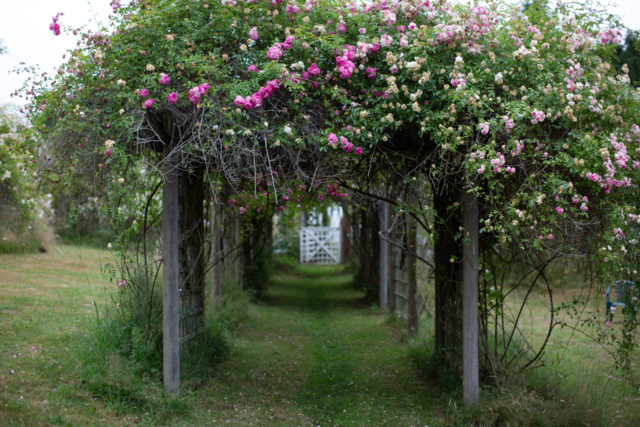 You have so generously shared what you’ve learned with so many and I would love to know how myself and Floret readers can support your work into the future. How do we ensure that these rare and heirloom rose varieties live on? How can we pick up the torch and help carry your legacy forward?
You have so generously shared what you’ve learned with so many and I would love to know how myself and Floret readers can support your work into the future. How do we ensure that these rare and heirloom rose varieties live on? How can we pick up the torch and help carry your legacy forward?
Keep them watered, fertilized, and in a place with lots of sunshine. Roses, especially the old roses, are very easy to grow. However, inviting people into your gardens and sharing is perhaps most important. Don’t be stingy. To inspire and introduce people to the beauty of old roses and sending cuttings of roses into their home gardens, is an act of love … of friendship. This is the greatest legacy.
Max and I used to have people over all the time to enjoy the property, and many friendships as lovely as the roses developed. I couldn’t do that for a while, but now that my son and his wife are restoring the gardens, we have been able to do this again on a very limited basis (and keeping public health recommendations in mind). It’s such a joy to see old friends again, such as you, Erin. I believe you were a young lady when I first met you. So many memories tie us all together.
I have given many roses away over the years—to individuals, nurseries, and to other special collections and demonstration gardens. Recently I was notified by Claude Graves, curator of the Chambersville rose garden in Texas and the Anne Belovich Rambler Garden there, that the American Rose Center Committee voted to begin the process of replicating my entire rambler collection in Chambersville into a new garden to be constructed at America’s Rose Garden at the ARS Headquarters in Shreveport.
It is a comfort and honor knowing that my rambler collection will be duplicated and conserved in a permanent internationally-acclaimed garden. I am grateful to Dean and Carol Oswald and Claude Graves for their dedication to and hard work on this large project. I am also grateful to my friends who have watered, fertilized, and put one of my rose cuttings in a place with lots of sunshine and continue to share cuttings with their friends, both old and new, and younger family members.
In addition, consider organizing volunteer efforts to help out in rose gardens that need extra hands. What we consider older roses now can be found in many home gardens that were started by people in their younger years. The work of weeding, fertilizing, and pruning can be satisfying but enriched by stories, expertise, cuttings, and new friendships. We will have our first pruning party in February with area-old garden rose enthusiasts and garden clubs. Consider these kinds of events in your local community.
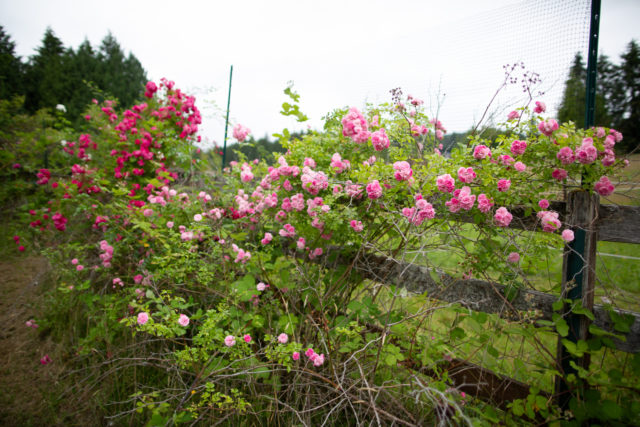 You can learn more about Anne on her website, where her family has begun publishing blog posts that she wrote before her passing.
You can learn more about Anne on her website, where her family has begun publishing blog posts that she wrote before her passing.
I had the opportunity to interview Anne’s daughter-in-law Teddie Mower who is now caring for her extensive collection of ramblers alongside her husband Rick, Anne’s son. In the interview, she gives an update on Anne’s roses, information for those interested in visiting the property, and how we can all help carry on Anne’s legacy.
If Anne’s story has moved you, please consider adding one of her books to your library. Proceeds from the sales of her books will help support the preservation of her rambling rose collection.
Gallica Roses by Anne Belovich
Large-Flowered Climbing Roses by Anne Belovich
The Little Book of Alba Roses by Anne Belovich
Moss Roses by Anne Belovich and Harald Enders
Ramblers and Other Rose Species Hybrids by Anne Belovich
A Voyage of Determination by Anne Belovich
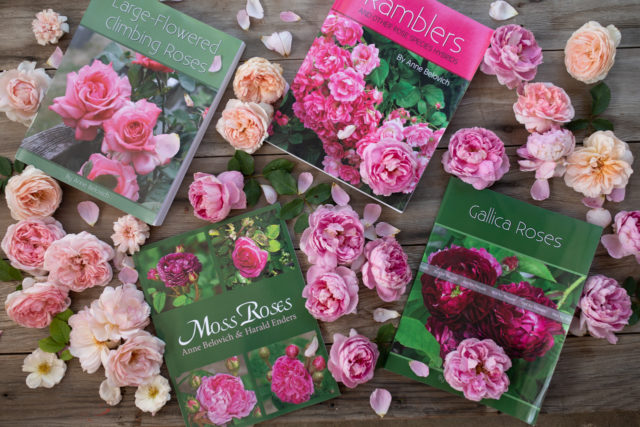 I thought it would be fun to give away Anne’s complete library of books to three lucky readers. To enter to win, please share what part of her interview inspired you the most. This giveaway is open to both U.S. and international readers. Winners will be announced here on May 30.
I thought it would be fun to give away Anne’s complete library of books to three lucky readers. To enter to win, please share what part of her interview inspired you the most. This giveaway is open to both U.S. and international readers. Winners will be announced here on May 30.
Update: A huge congratulations to our winners: Michelle, Pam Blinten and Carrie K.
Please note: If your comment doesn’t show up right away, sit tight; we have a spam filter that requires us to approve comments before they are published.
Floret only lists companies and products that we love, use, and recommend. All opinions expressed here are our own and Floret does not offer sponsored content or accept money for editorial reviews. If you buy something using the retail links in this post, Floret may receive a small commission. Thank you for your support!
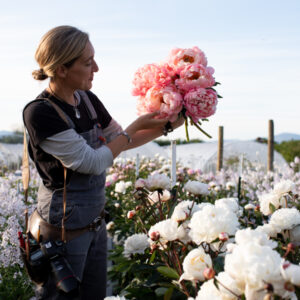
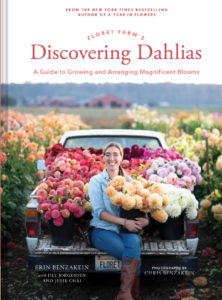

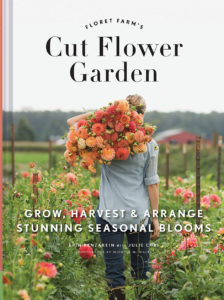

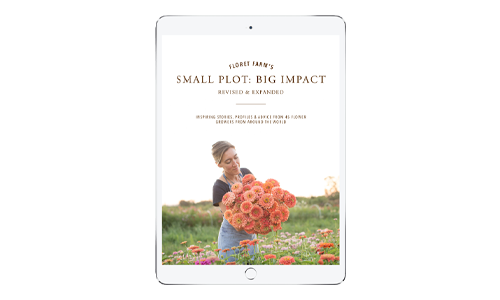
Tammy Hawkins on
I am turning 60 this year in August. My father died from alzheimers last July. As did his mother and sister years before. All getting around 65. I woke up this morning so depressed it was raining out and I have planted over 200 dahlias this year trying to start a cutting garden to sell cut flowers. I’m starting this with my daughter who has a autistic son and needs to be able to be stay at home mom for him. I have spent the past year feeling like I was just getting to old to start a new business venture and missed so many things in life I wanted to mark off my bucket list but was running out of time. Everyday just feeling like my clock was ticking. So just by chance I was back at Floret reading and exploring as I love all the info and the images of beautiful flowers. What a inspiration has this article been to me. Wow. I have a whole new outlook, im not almost 60. Im barely 59 lol. I told myself if I didn’t get a lot of my contract work this spring I wouldn’t worry. I would just know it was God telling me to dive deeper into my floral passion. And this article definitely has me knowing I need to stay on track with my dahlias and keep pushing forward. Someday i will see Floret farms in person in all its beauty. Thank you so much for all you pay forward to the flower community. God has put you on the perfect path. I love what you do and God bless you for caring and sharing.